
Expected to be the largest city on Earth by the end of the century, Lagos is a fascinating metropolis offering its visitors the ultimate African urban experience. The former capital city and the current economic and cultural heart of Nigeria, Lagos is a mixture of hectic street scene, bustling markets and endless stream of people, everywhere and around the clock. Despite the city having a bad reputation for being unsafe, overpopulated and polluted, it is also home to luxurious hotels and boutiques, magnificent natural reserves and extremely friendly people, willing to assist and socialize with foreigners at any given moment.
If you are a first time visitor to Lagos, probably the most mind boggling thing you’ll come across is the informal commerce anywhere in the city, perpetually overflowed by street hawkers selling absolutely everything.
Amidst Lagos chaotic and sometimes rowdy urban landscape, few markets stand out as more unique, one of them is undoubtedly Jankara Market, where you can find an open display of chicken and turkey cages, herbs and unique potions with supposedly healing properties and colorful Nigerian fabrics famous throughout the world for their flamboyance. Due to a large scale fire couple of year ago, the market had to relocate to the nearby streets, so be prepared for extra effort finding all of its magnificent merchandise.
Another market not to be missed is Oyingbo market, nationwide famous for vendors selling their fresh products ranging from locally grown fruits and vegetables to typical Nigerian street food cooked in front of buyers.
Lagos also has plenty of markets not focusing solely on food items, one such is Computer Village in Ikeja, known as the largest technology market in Nigeria and the rest of Africa.
This giant commercial open-air complex features shops selling laptops, computers, household electronic appliances, mobile phones and accessories, while its vast scale and competitiveness insures surprisingly affordable prices.
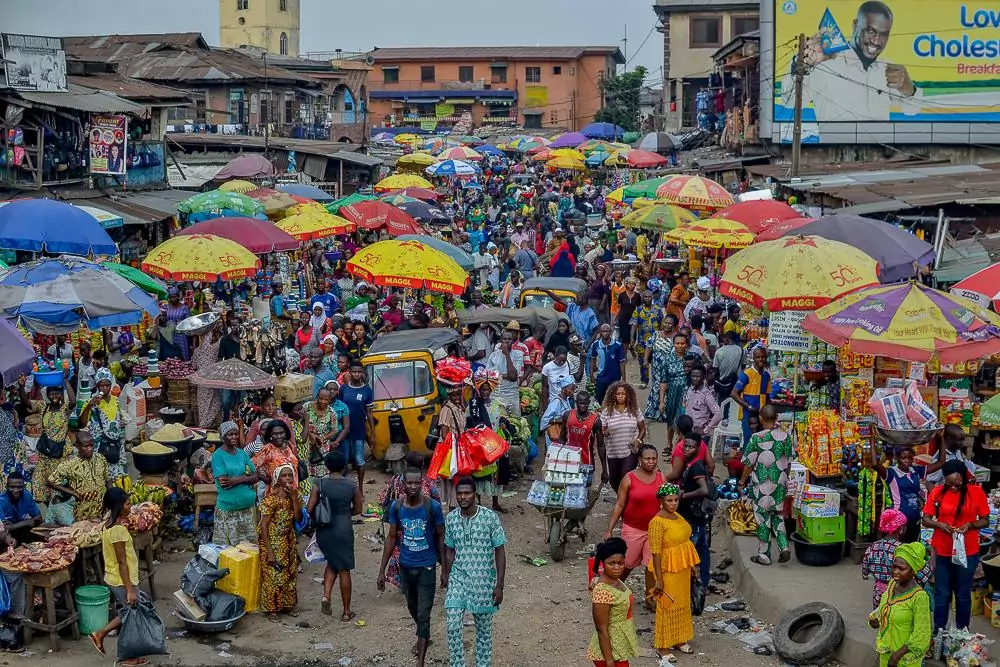
One of Lagos vibrant markets
photography by: Kaizenify
Referred by many as the Venice of Africa, Makoko floating village is far less glamorous than its European sister, yet full of exciting and unique sights unparalleled by any other place worldwide.
Built on stilts over Lagos Lagoon, Makoko floating village is actually only part of a larger neighborhood holding the same name, and home to mostly migrants from other states in Nigeria and the republic of Benin.
While some might call it a floating slum, Makoko is much more than that, this informal fishing community exhibited extremely strong endurance over the years by surviving a government orchestrated demolition, climate related events and acute poverty, all have shaped the village as a multilayered urban tissue with proudly resistant inhabitants.
Until its collapse by a tropical storm in 2016, Makoko floating school was dominating the village landscape, this famously renowned unicorn was designed by a Nigerian born architect and meant to provide an adequate school building for Makoko’s children, who previously had to study under shoddy conditions. As of 2019, a new building model funded by NGOs is planned to serve as a replacement.
For travelers who seek visiting Makoko, it’s recommended to take a guided tour offering a canoe boating throughout the village, experiencing it firsthand.
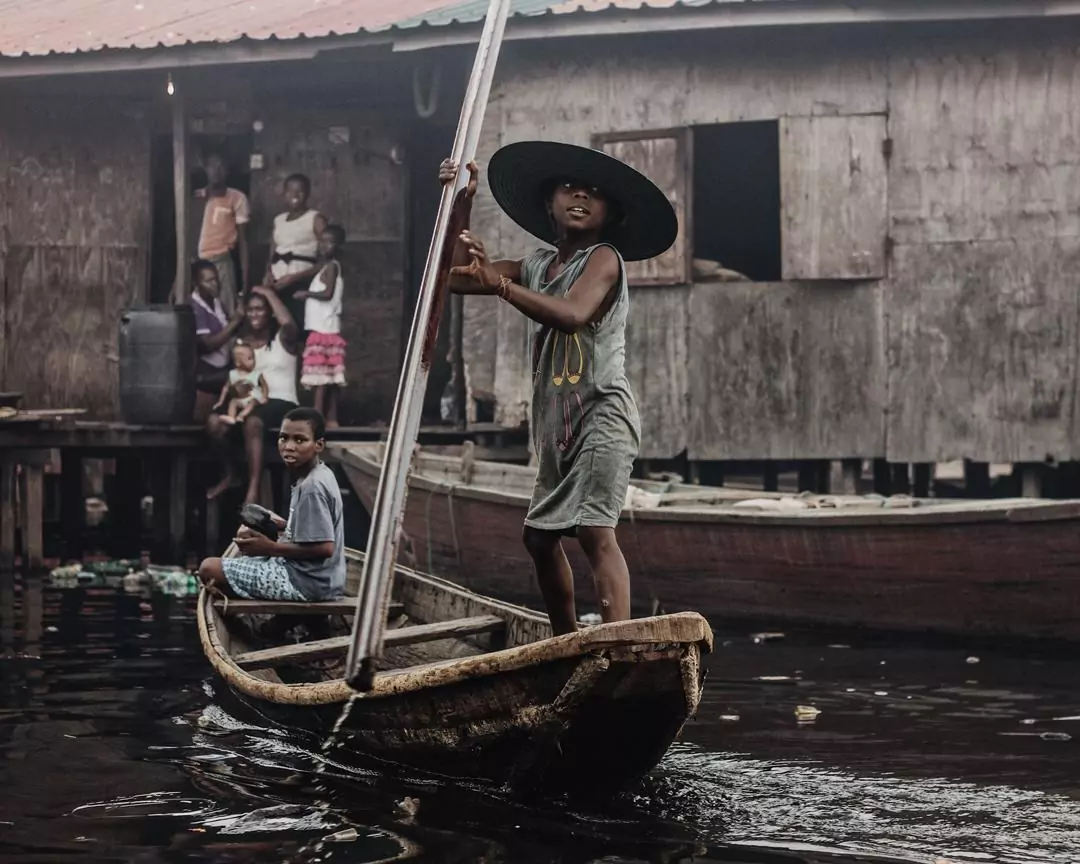
Makoko scenery
photography by: Buchwithlenses
Major parts of Lagos are overcrowded, flooded by human activity and traffic congestion, thus it may come as a surprise that the city has several enclaves of African authentic wilderness, one of them is Lekki conservation center, a protected speck of swampy lands.
The 78 hectare reserve is home to plenty of wild animals such as monkeys, tortoises, crocodiles and endemic bird species. Due to its relative small size and the abundance of wildlife, the center’s animal population is extremely dense, making the prospects of spotting them pretty much guaranteed.
A somewhat unique feature of Lekki conservation center is its canopy walkway, the longest one in Africa. A network of several elevated walkways is connected by a couple of panoramic lookouts, providing an opportunity for breathtaking vistas and a close encounter with wildlife.
The center is located about 30 km from central Lagos, accessible by cars and public transportation alike, while some hotels organize tours for their guests.
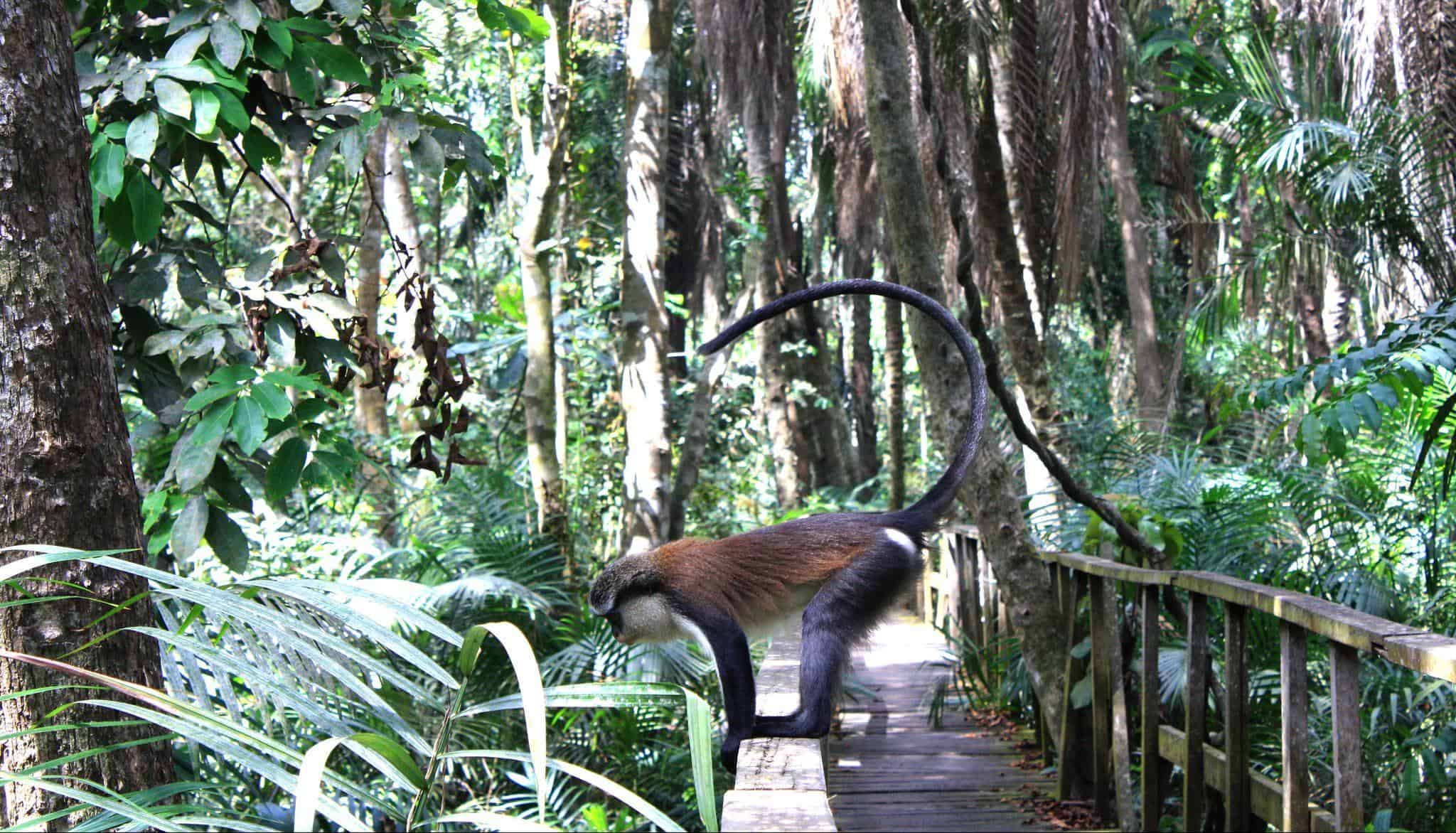
A monkey at Lekki Conservation Center
photography by: Clara Sanchiz
As a coastal metropolis, Lagos has a plethora of beaches featuring many kinds of activities and attractions, making it the perfect gateway from the hustle and bustle across the city.
One of the beaches where the city meets the Atlantic Ocean is Tarkwa Bay, adjacent to Lagos harbor and accessible solely by boat or water taxi. The beach is popular among surfers fearlessly performing impressive stunts on giant waves, while the vendors selling freshly picked coconuts at around 50 cents, are complementing the surfing spectacle with a sweet aromatic coconut juice.
A more distant option is Eleko Beach, at a roughly 4 hour drive from Lagos this privately owned beach offers rather unique experience compensating for the efforts of reaching it. The beach has countless rentable bamboo huts for visitors seeking some privacy, while the main pastime activity is horse riding along the shoreline. The beach’s most enticing attraction are the local fishermen offering sunbathers their day’s catch, usually large portions of barbecued fish and prawns.
Lagos is bestowed with many more beaches, each unique in its own right. Travelers looking for peace and tranquility are advised to come at weekdays since most beaches tend to be pretty jam-packed during weekends.
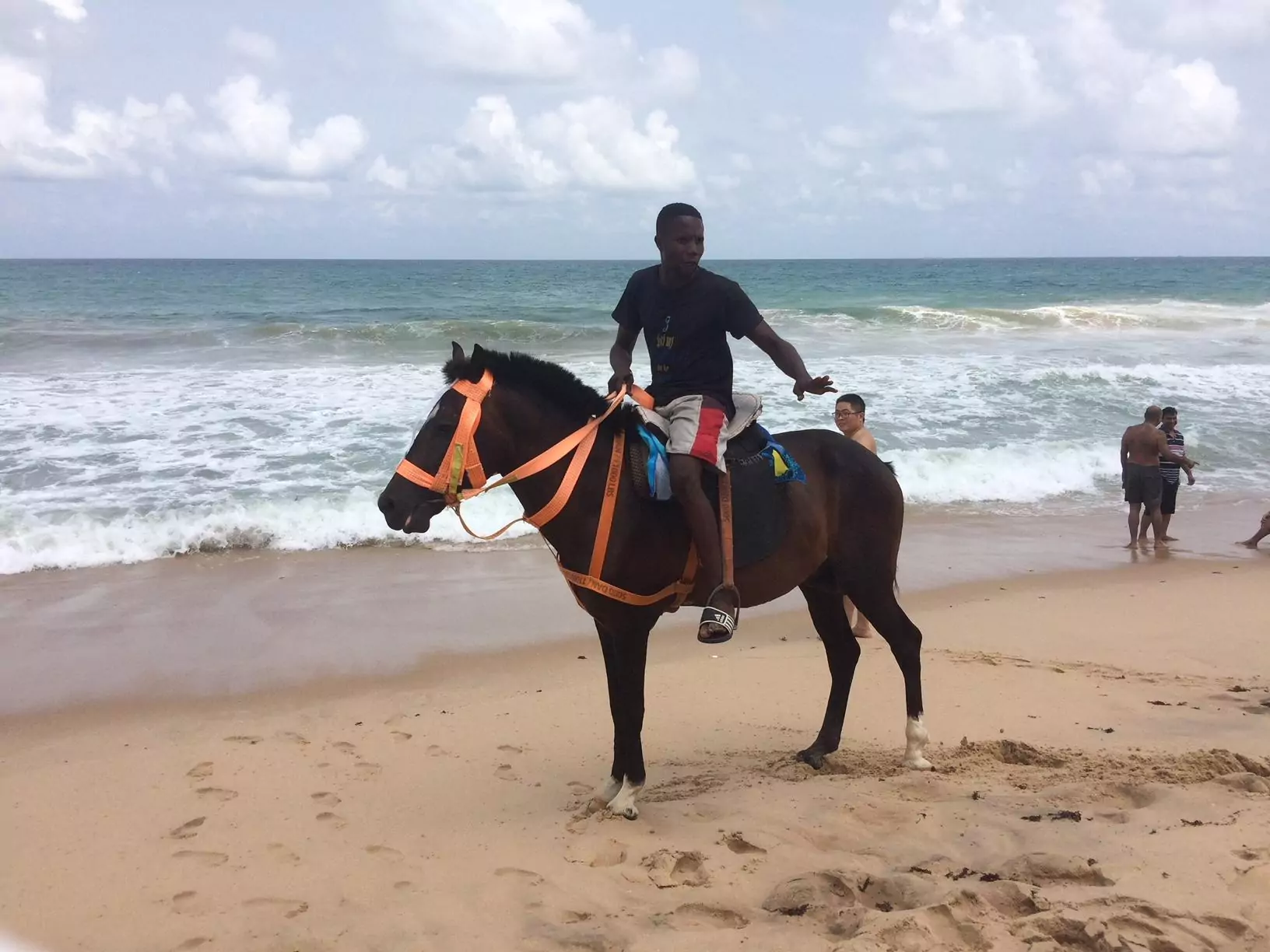
Horse riding at Eleko Beach
photography by: JayMisra
Lagos is notoriously known for its traffic jams, some stretching for kilometers and lasting for hours upon hours, however, the Lagosian creative spirit came up with a low-cost solution, a motorcycle taxi aka Okada.
The term “Okada” derives from a bankrupted Nigerian airline which used to operate at 1980’s-1990’s, around the same time when the motorcycle became popularized throughout the country and as alluded by its borrowed name, meant to rapidly commute through the urban jungles of Lagos and other cities in Nigeria, often characterized by the prevalence of traffic congestion and unpaved narrow roads.
Nowadays, Okada is not only an efficient mean of transportation with significantly less commuting time but also an authentic way to experience Lagos, navigating between swarms of cars and head-carrying women with banana bundles, offering fascinating and exceptional sights.
Due to the many accidents involving Okada riders, safety regulations have been introduced by the local government banning motorcycle taxis from certain roads within Lagos, making it a much safer practice, though it’s suffice to say that taking all safety precautions while riding is still crucial.
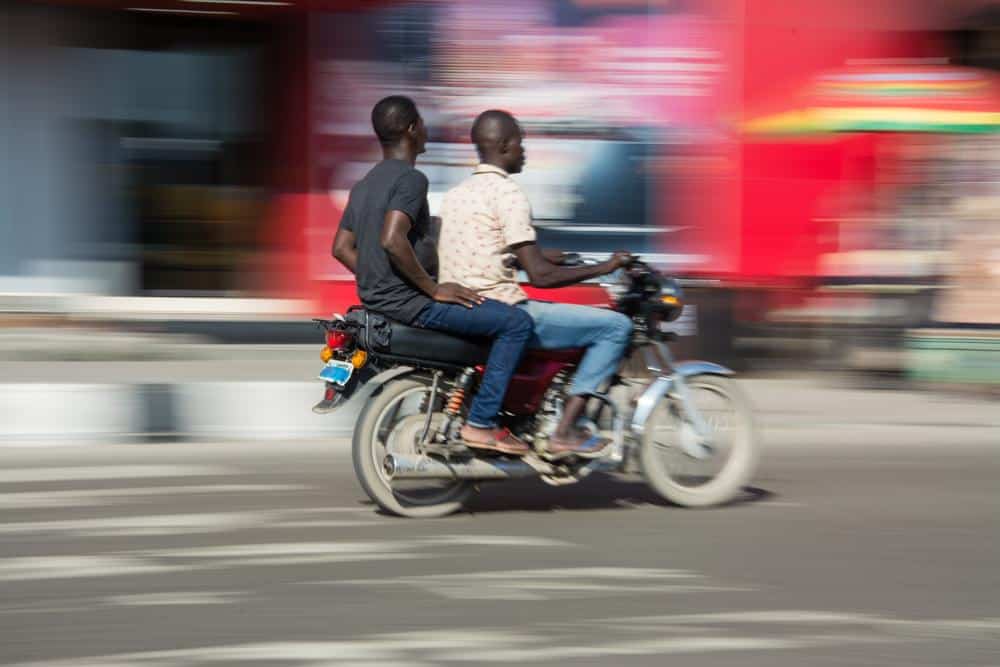
Okada Taxi at Lagos street
photography by: Olasunkanmiariyo
Nigeria is religiously split, while the country’s northern part is overwhelmingly Muslim, the south, including Lagos and the neighboring Ogun state, is predominantly Christian. Unlike most of the developed world, religion plays a major rule in Nigerian society, practiced on daily base by fully dedicated believers.
There is nowhere this devotion is manifested better than in Lagos Megachurch events, organized by the Redeemed Christian Church of God, a Pentecostal brunch of Nigerian evangelism.
Most events take place at redemption camp, a city-like mega complex 2 hours drive from central Lagos. This religious compound is so large it functions as an independent city with its own banks, police station, hospital, supermarket and more than 5,000 houses.
Redemption camp’s crown jewel is its massive 3km long hangar shaped auditorium with a staggering size of over half a square kilometer and a capacity of far beyond 1 million worshipers.
Every first Friday of each month the church holds the monthly Holy Ghost Service, an event attended by hundreds of thousands of church members and foreign guests.
Enthralling chorales fusing African and Christian traditions coupled with religious homilies by enthusiastic pastors are usually the bulk of each event, ravishing as it might be, the gigantic scale and the opportunity to engage in conversation with warm and hospitable Nigerians is possibly one of the most interesting experiences to relish at.
Tucked away between Lagos and the country of Benin, the charming town of Badagry has a sinister past, as its port was one of the epicenters of the Trans-Atlantic slave trade, culminating during the mid-18th century.
It’s plausible to say that millions upon millions of people with African ancestry living today in the new world are descendants of slaves once transported from Badagry Town.
Hence, it should come as no surprise that the town’s tourism mainly revolves around its slavery legacy, offering couple of museums presenting its painful history beyond the local perspective, one of which is Badagry Slave and Black History Museum, displaying relics like chains and handcuffs, originally used as means of slave incarceration. The museum visit can be followed by a tour to the nearby notoriously known pier, used as shipping point of thousands of slaves, nowadays serves as a reminder of its former grim role.
Following the aforementioned information, you might think that all the town has to offer are slavery-oriented site, but that couldn’t be furthest from the truth, since it’s also home to the first storey building in Nigeria, known as a focal point of many historic events including the dwelled place of the first bank in the country. Additionally, Badagry is where Christianity was first introduced and preached in Nigeria, marked by the Agiya Tree Monument.
A perfect way to end a day trip full of historic and cultural insights, is by having a dinner with locally made delicacies as the sun is setting, tinting the sky with magnificent reddish colors.
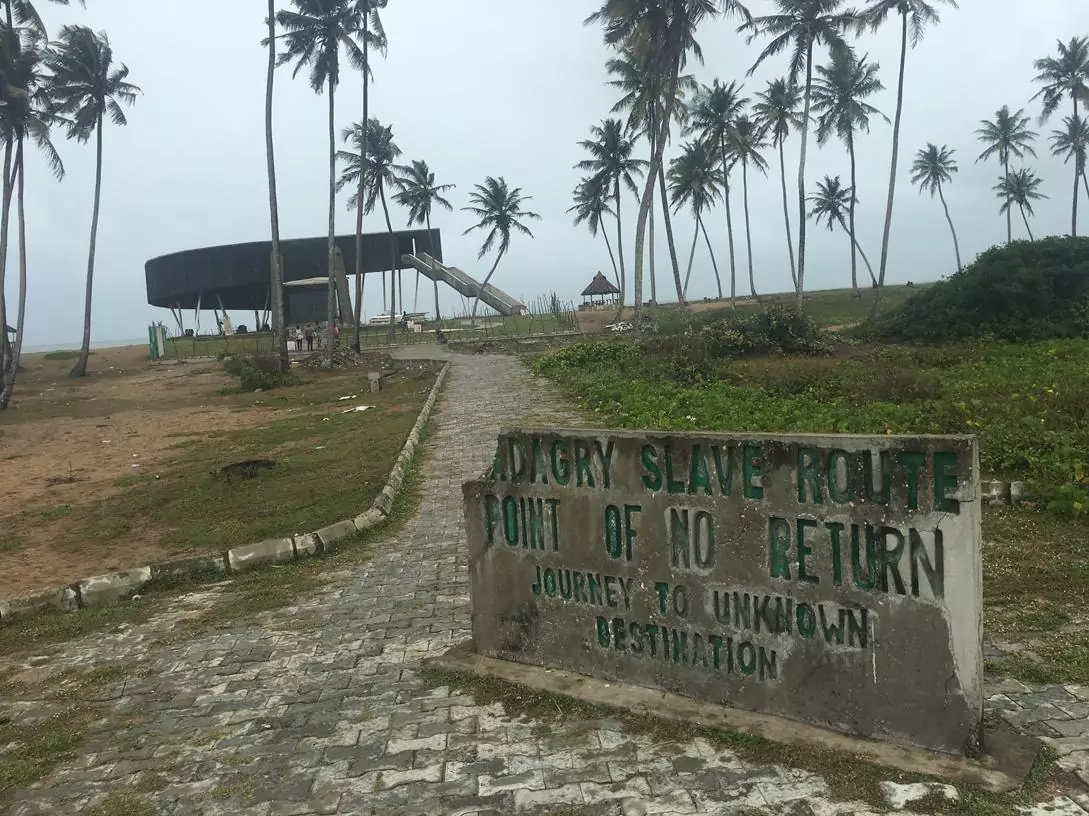
The point of no Return monument, Badgary
photography by: Mmartin1460
Lagos hectic pace can be overwhelming for some people after a while, thus time off from the ultra-vibrant front is occasionally needed just to refill your batteries. Contrary to generic shopping malls which don’t provide any sort of local experience, few hours in Terra Kulture Center is the ultimate chance to visit an authentic place free from the hustle and bustle of downtown Lagos.
Accommodating a wide range of activities under the same roof, Terra Kulture grants its visitors a glimpse into parts of Nigerian culture.
The center holds exhibitions, special events and art auctions for people who wish to delve into Nigerian craft and design, additionally, a modern arena hosts performances and local theater shows artistically discussing the country core issues (it’s advisable to check their website for timetable.
If you seek to catch some words in one of Nigeria’s most spoken languages, Terra Kulture also has an educational section with classes in Yoruba, Hausa and Ibo, enriching yourself with an original vocabulary to show off at home.
Hours of culture consumption might make you hungry, Terra Food longue is not only the perfect place to balance that, but also a one-time opportunity to experience Nigerian traditional cuisine at its best, Jollof rice, catfish pepper soup and yam pottage are just few of the dishes to be indulge at.
According to some estimates, roughly 65 percent of Lagos inhabitants are considered poor, including over one million people living in extreme poverty with limited access to clean water and electricity, gloomy as it might be, Lagos also has a different side, where increasing number of middle class Nigerians enjoy high living standards similar to their counterparts in the developed world.
One epitome of that prosperity is the abundance of newly opened fashion boutiques, springing up like mushrooms, branding Lagos as a fashion stronghold.
While many boutiques focus on international brands, MeiDei (31-33 Town Planning Way, Ilupeju) is the perfect place to look for original African garments, their ample wardrobe offers curated elite fashion inspired by traditional Nigerian motifs, spanning from a flamboyant multi-color skirt to monochromatic and silk-made Agbada, a classic West African clothing. Another decent option is Zazaii (36 Balarabe Musa Crescent, Sir Samuel Manuwa Street), introducing shoppers with modern African apparels designed by less familiar brands and individuals, pleasantly displayed at a sunlight rich atelier.
One candidate for being ranked as the most eye catching boutique in Lagos is undoubtedly Alara (12A, Akin Olugbade Street, Victoria Island), this iconic four-storey building was designed by the famed British-Ghanian architect David Adjaye, making it a glamorous unicorn at the heart of Lagos.
This fashion center has a gigantic choice of African and international brands, unique accessories and authentically crafted art pieces showcasing Nigeria’s ethnic diversity.